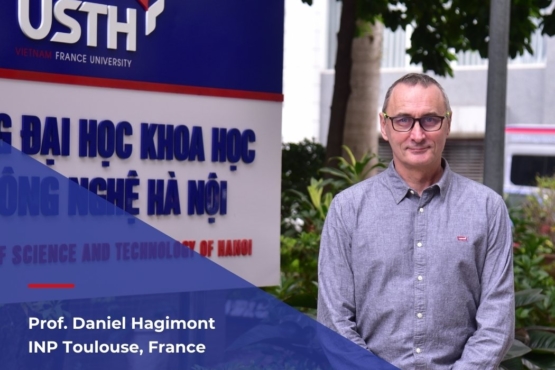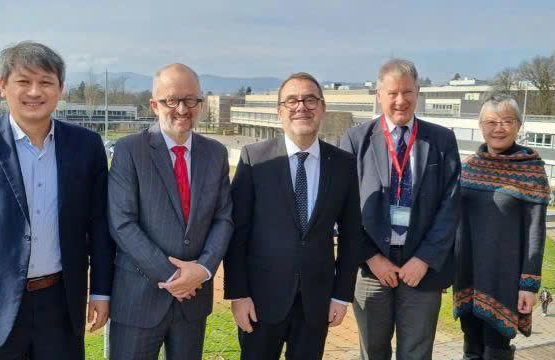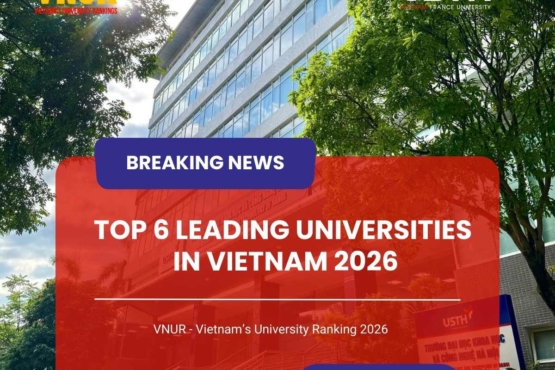On October 17th, 2024, University of Science and Technology of Hanoi (USTH) had a meeting with Heriot-Watt University on the cooperation plan for the upcoming time.
Participating in the meeting, on the side of USTH, was Prof. Jean-Marc Lavest, Principal Rector; Assoc. Prof. Mai Huong, Deputy Director of the Department of Water – Environment – Oceanography; Alexis Chaigneau, Deputy Director of the Department of Water – Environment – Oceanography; Dr. To Thi Mai Huong, Deputy Director of Direction of Research, Innovation and Technology Transfer; and Ms. Do Thi Thuy Trang, Deputy Director of the International Cooperation Department.
On the side of Heriot-Watt University, was Prof. Thomas Wagner, Professor at The Lyell Centre, Dr. Ryan Pereira, Associate Professor at The Lyell Centre, Dr. Heidi Burdett, Associate Professor at Umeå University, Dr. Ingrid Kelling, Assistant Professor at The Lyell Centre, Dr. Max Webb, Senior Technician at The Lyell Centre, Dr. Nguyen Minh Duc, Postdoctoral Research Associate at The Lyell Centre, Ms. Jennifer Scott, PhD Researcher at The Lyell Centre.
In addition, USTH warmly welcomes Vietnamese representatives from Phenikaa University, Institute of Vietnamese Studies and Development Science, Vietnam Institute of Fisheries Economics and Planning, Institute of Strategy and Policy on Natural Resources and Environment, and Fisheries and Technical Economy College.

During the visit to USTH, Prof. Jean-Marc Lavest and representatives of relevant departments discussed with representatives from the Lyell Centre, Heriot-Watt University, regarding potential training programs and research projects. Department of Water – Environment – Oceanography (WEO) is currently offering bachelor and master programs in environmental science, with several prominent research directions such as: assessing and monitoring pollutants in soil, water, and air; studying the impacts of pollutants on ecosystems; and researching ocean physics and the transport of pollutants from the continent to the ocean. These research directions align closely with those at the Lyell Centre, creating a foundation for the two sides to discuss and agree on enhancing future research cooperation and academic exchange. Notably, USTH students will gain the opportunity to intern or participate in exchanging the short-training programs at the Lyell Centre.



Currently, the Department of Water – Environment – Oceanography (WEO) of USTH is participating in the Project on Sources, Sinks and Solutions for Impacts of Plastics on Coastal Communities in Vietnam (3SIP2C). The project is funded by the Global Concentration Research Fund (GCRF) through the Natural Environment Research Council (NERC) of the UK Research and Innovation (UKRI) and implemented by Heriot-Watt University (UK) and 07 partners in Vietnam.
Objectives:The 3SIP2C project aims to understand the sources and sinks of plastic waste, assess the impact of plastic waste on civil society and coastal businesses, human health and safety. Policy analysis was undertaken to identify effective interventions and propose plastic waste reduction schemes through a comprehensive engagement program at local, regional, and national levels. Main Activities:• Quantify the flow of plastic materials into the coastal environment, uptake by aquatic organisms, and deposition to the seafloor. • Identify main plastic particle types, associated contaminants of potential concern, and pathogens of risk to the ecosystem and human health. • Develop a plastic particle transport model to understand transport pathways from river mouths along the coast and how these change with season. • Engage governments, civil society, and relevant businesses to quantify the scale and economic risk of plastics in the coastal zone. • Establish an equitable and collaborative platform for knowledge exchange to reduce plastic production and consumption responsibly. • Build a core capacity of Vietnamese and UK teams to assess, mitigate and recommend current and future strategies for plastic waste management in the Vietnamese coastal zone. • Develop a long-lasting circle of expertise through engagement with strategic partnerships between academia, Government institutes, and non-academic organizations. |





